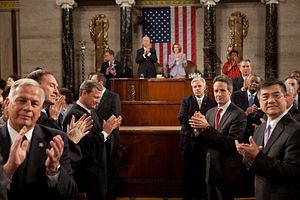With Washington D.C. all abuzz preparing for Japanese Prime Minister Shinzo Abe’s upcoming visit – which will include an official summit meeting with President Barack Obama and a joint congressional address – one of the top issues in the Beltway these days is the question of Trade Promotion Authority (TPA), which could make or break negotiations for the Trans-Pacific Partnership (TPP).
The TPP, a trade deal being negotiated among 12 states including the United States and Japan, would cover a third of world trade. Many policymakers and scholars consider TPP a critical component of the U.S. “rebalance” to Asia, and thus argue the negotiations should be seen in strategic as well as economic terms. As such, getting TPA, which will allow Congress to only vote up-or-down on any negotiated deal – precluding them from making any last-minute amendments – is seen as critical to the success of the Obama administration’s Asia policy.
House and Senate committees introduced legislation that would give President Obama “fast-track authority,” another name for TPA, but with stipulations such as limits on currency manipulation, restrictions on imports produced by child labor, and prohibition of any country considered a violator of human-trafficking laws. However, the debate is far from over. Obama’s toughest challenge may come from his own party — Republicans generally favor the trade deal, while Democrats oppose the bill because of labor and environmental considerations. For example, Paul Ryan, who ran as vice-presidential candidate in 2012 against Obama, defended giving the administration greater authority, while prominent Democrats Sherrod Brown and Elizabeth Warren have been putting up significant opposition.
TPA may be seen as a U.S. domestic political issue, as political interest groups cross bridges and form interesting coalitions for and against TPA, but it is also an important issue for Japan and the United States’ ten other negotiating partners as well. Without TPA, the other TPP negotiators cannot have confidence that what they negotiate for is what they get from the United States. A trade deal will always hurt some economic sectors more at the expense of benefiting others, and negotiating partners want assurances that the Obama administration is strong enough domestically to carry through on whatever is promised.
Full votes on TPA in the Senate and House are not expected until early May, while trade ministers from the 12 negotiating states are expected to meet in late May. Playing the game on two fields – the domestic and the international – the Obama administration has their work cut out for them to score a “win-win” agreement– which is absolutely essential to securing the United States’ preeminent role as a participant in the Asia-Pacific order-building process.
However, negotiations on not only TPA but also TPP appear stalled for the moment. Caroline Atkinson, Obama’s deputy national security adviser, recently downplayed expectations of a TPP breakthrough during Abe’s visit. “We’re not there yet,” she said. As negotiations between the United States and Japan on automobiles and agricultural products continue to rumble on, Atkinson stated, “We expect the leaders … to have the opportunity to discuss what should be the next steps together. But we do not expect any announcement of a final deal” during Abe’s visit.
As Sheila Smith has said, the consequences of not securing TPP would be severe because it would send a signal that the United States is not actually that serious about “rebalancing” to Asia. The “rebalance” is not just a military strategy or “containment” strategy, but a whole-of-government effort to fully integrate the United States in the economically fastest growing region of the world. Another risk of the TPP failing, as Adam Posen points out, is the risk that the momentum for regional order-building could shift in China’s favor if TPP is not secured.
However, in the long-term, the U.S. commitment to Asia will appear all the more credible after it has passed the crucible of intensive domestic debate. Japan, though appreciative of the United States commending the importance of the “alliance” and lauding “common values,” would really feel much more comfortable with a United States that is bound to Japan out of its own economic self-interest. The rough-and-tumble debates we can expect in the Senate and the House over the next few weeks – though a significant difficulty – can also be seen as an opportunity for the Obama administration to publicly make the strongest case possible to the public that TPP is really in the interest of the United States.
Japan, and the ten other TPP-aspiring states, cannot hope for anything more.

































